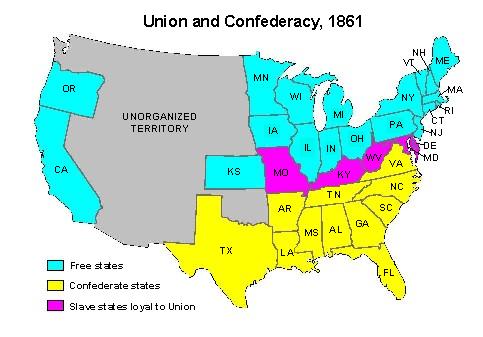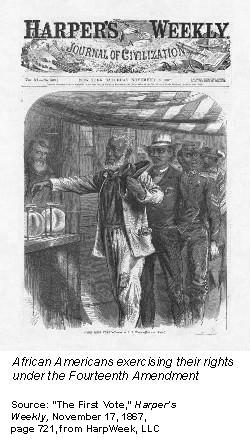

War was now certain because Lincoln was determined to preserve the Union. The states that remained in the Union had more than 22 million people at this time, compared with the Confederacy's 9 million. The Union also had the factories necessary to produce arms for war and far more railroads than the Confederacy had. This would be the first war in which railroads played an important part.
Neither the North nor the South was prepared for a war. The U.S. army numbered only 16,000 men, and many of them were stationed in far western territories. The Confederacy had to raise an army overnight. Threatened by invasion at any moment, both sides prepared rapidly. In the spring of 1861 Americans waited uneasily for the fighting to start. Few imagined the long and bitter war that was to come.The war got under way in July of 1861. A Union army marched from Washington, D.C., to Bull Run Creek (Manassas) in Virginia, about 25 miles away. Victory seemed so certain that many Washington citizens followed the army to see the show. But the victory went to the Confederates. The Union soldiers and spectators hastily retreated back to Washington, D.C.
 The Battle at Bull Run revealed two important advantages the Confederates had. They were fighting on their home territory, as they did through most of the war, and they had better generals, at least in the early years of the war. President Lincoln had to keep changing his commanding generals until he found Ulysses S. Grant late in 1863. The war went well for the Confederacy in the first two years. Its brilliant general, Robert E. Lee, defeated larger Union armies in battle after battle in Virginia. In the West, large Union armies won few major battles.
The Battle at Bull Run revealed two important advantages the Confederates had. They were fighting on their home territory, as they did through most of the war, and they had better generals, at least in the early years of the war. President Lincoln had to keep changing his commanding generals until he found Ulysses S. Grant late in 1863. The war went well for the Confederacy in the first two years. Its brilliant general, Robert E. Lee, defeated larger Union armies in battle after battle in Virginia. In the West, large Union armies won few major battles.
Then, in July of 1863, the tide turned. Lee lost in a three-day battle at Gettysburg, Pennsylvania. On the same day, the important Mississippi river town of Vicksburg fell to a Union army under Grant. The fall of Vicksburg gave the Union control of the Mississippi River. This meant the Confederacy was no longer able to get vital supplies from the states west of that river.
From this time on, the Union's larger armies made the difference. Lincoln appointed Grant commander in chief, and Grant pursued Lee's army in Virginia. Many soldiers died on both sides. But Lee's losses were more serious because he had few men to replace them.Farther south, Union General Sherman captured Atlanta and marched his army through Georgia to the sea. He then moved north through the Carolinas to meet Grant in Virginia. Sherman didn't arrive in time to fight. With short supplies making the Confederate cause hopeless, Lee surrendered to Grant on April 9, 1865.
Back to Top At first, Congress took charge of the federal government because an ineffective president, Andrew Johnson, succeeded Lincoln. Like Lincoln, Johnson wanted to be generous toward the South, but Congress would have none of it.
At first, Congress took charge of the federal government because an ineffective president, Andrew Johnson, succeeded Lincoln. Like Lincoln, Johnson wanted to be generous toward the South, but Congress would have none of it.
For a time the freed slaves got help from the Freedmen's Bureau. Set up in March of 1865, the bureau built schools and hospitals and helped African Americans find homes and jobs. It also established colleges for African Americans that still thrive today.
Congress divided the Confederate states into five military districts. An army general headed each district. Congress also required each state to accept the Fourteenth Amendment and to write a new state constitution before rejoining the Union. By 1870 all the old Confederate states had done this.Reconstruction, the rebuilding of the South, lasted another seven years. Military people from the North oversaw daily events. Carpetbaggers, as southerners named them, influenced many southern state governments. Carpetbaggers were northerners who moved to the South after the war. They aimed to make money and force their northern viewpoints on the southerners.
Finally, in 1877, the federal government ended military rule in the South. Southern whites regained control of their state governments. The Freedmen's Bureau ended, and African Americans suffered discrimination. Equal opportunity and basic rights were denied them. Their situation went largely unchanged for the next 80 years.